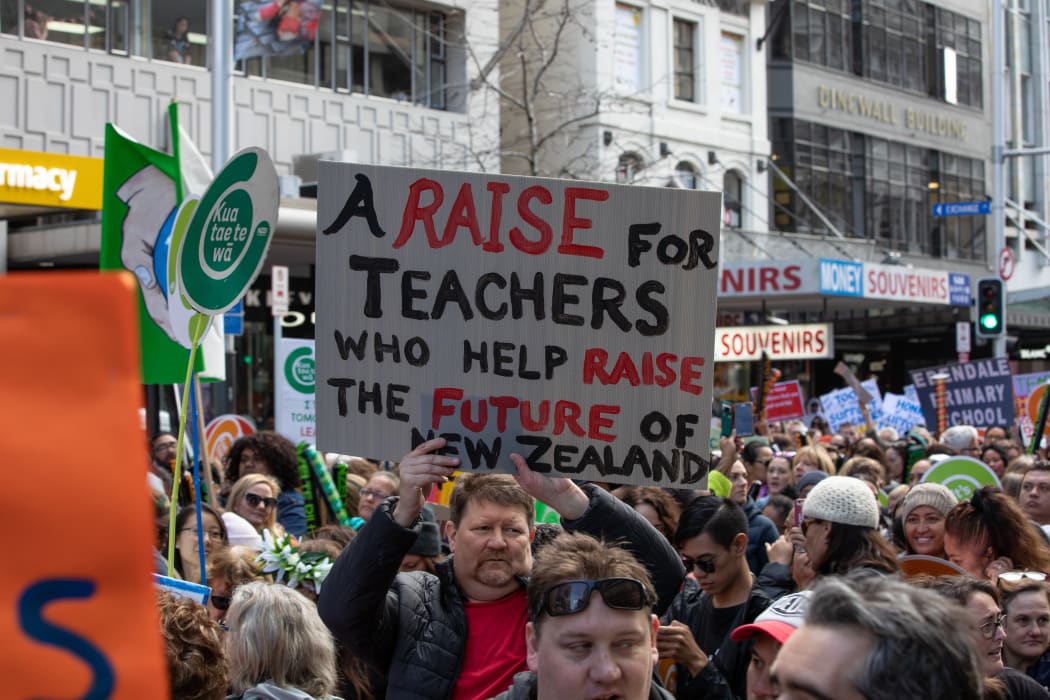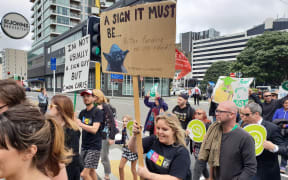Parents are being forced to find alternative arrangements for their children ahead of a nation-wide teachers' strike at the end of the month.

Photo: RNZ / Dan Cook
Almost 50,000 primary and secondary teachers will walk off the job on 29 May - following the rejection of a combined pay offer worth around $1.2 billion.
More than 750,000 students will be affected by the mega-strike, but the government said there was no more money to meet demands.
Checkpoint spoke to several parents who said they would either take time off work or one of the spouses would stay home. Parents of older children said they would leave them home alone.
The Post Primary Teachers' Association has already decided to take five more weeks of industrial action, and primary teachers are thinking the same way.
Since the news was announced yesterday, RNZ had been flooded with text messages from teachers saying the way the government was presenting the pay offer was misleading.
For example, when the Ministry of Education said teachers were being offered an average $10,000 pay increase - teachers pointed out the beginning teacher rate would only increase by about $4,500 over three years.
Feilding Intermediate's principal Diane Crate said pay parity with high school teachers was a big part of their demands.
She said the cooking, fabric, wood and metal work teachers at her school got more money because they were on high school teacher contracts.
"Whilst they're working in the same school, teaching the same children, they're on a much better deal. They're getting more money, more release, better conditions," she said.
Analysis by primary teachers union the NZEI showed their wages have failed to keep pace with rises in the average, median, and minimum wage between 1998 and 2017.
Read the full NZEI analysis on wage rates.
In the past, Diane Crate said she would get plenty of applications for teaching roles, but now she often has to re-advertise the jobs.
"We don't want just any old people to be going teaching. We want - in front of all of our children - the best possible teachers," she said.
Teachers were struggling, and the chatter in her staff room showed they were prepared to take further action if needed.
"I'm hearing lots of teachers talking about what action could be next, could that be two/ three-day strikes, could that be indefinite strike action - there's a whole range of things being talked about. I'm certainly not hearing teachers saying 'oh, well, we might just have to give in'," Mrs Crate said.
But the government said its deal and work it was doing to ease workloads and increase teacher numbers was comprehensive, and that there was no more money on offer.
Associate Minister of Education Tracey Martin said the government wanted to work with teachers to make their jobs less stressful.
"There's lots of pieces of money that aren't just in this negotiating package, that Minister Hipkins and myself and the coalition government are trying very hard to remove the pressures out of the classroom for our teachers," she said.
The parties were likely to head to the Employment Relations Authority for talks.
Ellen MacGregor-Reid, the deputy secretary at the Ministry of Education said, "Ideally we would like to make joint applications with both unions to the Employment Relations Authority for independent facilitated bargaining. We invited the unions to join in these applications by letter on Friday. We have asked them to respond either way by 9am tomorrow".
"We are seeking facilitated bargaining because it is the strongest form of assistance available to the parties involved to reach a negotiated settlement. We are prepared to apply alone," Ms MacGregor-Reid said in a statement.
In the meantime, the government and teachers appear to have some way to go before they are able to reach agreement.





